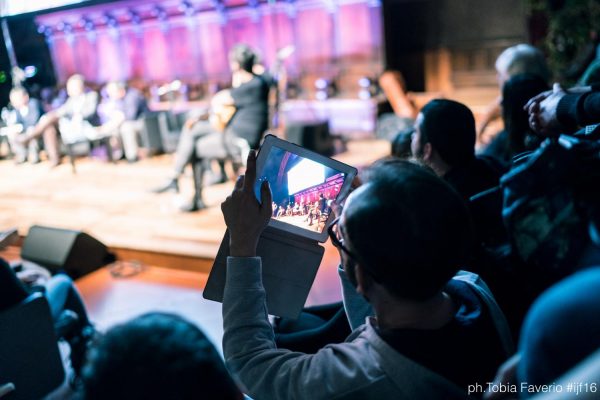
Perugia, Italy | 5–9 April 2017
The 2017 festival — the eleventh edition — will be the biggest and best yet. More than 250 sessions, more than 600 speakers, five full days of high-octane immersion in journalism — in and out of the festival venues — all in the stunning setting of the historic town centre of Perugia.
Festival speakers come from all over the planet. So too the attendees. All festival sessions are free entry for all attendees, without any need for registration.
About 200 volunteers will take part, involved in activities such as event reviews, speaker interviews, logistics, press office, etc. The volunteers — journalism students, aspiring journalists or journalists at the beginning of their careers — this year come from 27 different countries: Argentina, Australia, Bangladesh, Belgium, Bosnia and Herzegovina, Bulgaria, Canada, Czech Republic, Egypt, France, Georgia, Germany, Greece, Cameroon, India, Iraq, Italy, Netherlands, Pakistan, Poland, Romania, Russia, South Africa, Spain, Turkey, UK, Ukraine.
The festival programme is the result of the input of many different individuals, organisations, institutions and media companies. We thank them all for their contribution. We attempt to cover all the major issues of current interest in the media and beyond. We hope you find it stimulating. Each session in eleven different venues will be live-streamed, simultaneous translation in English-Italian will be provided for many.
We invite you to check out the full festival programme on the website, but to provide a taster we have prepared the following brief overview. By clicking on the session title you can link to full details of the session, and then add it if you wish to your personal festival day-by-day agenda on your computer or smartphone.
…
#ijf17talks
Four talks by leading figures on issues of major public interest.
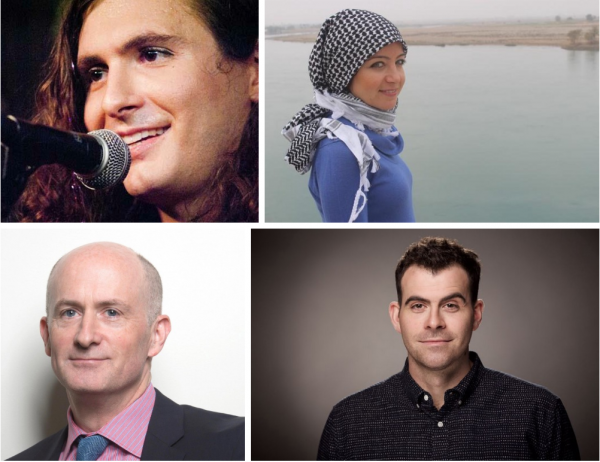
Evan Greer — Campaign Director, Fight for the Future
How we saved Chelsea Manning’s life: when activists, lawyers and journalists mobilize together online
moderator Philip Di Salvo
Zaina Erhaim — Institute for War and Peace Reporting
Zaina Erhaim: covering the Syrian war as a journalist, activist and woman
moderator Maria Gianniti
Cameron Barr — Managing Editor, The Washington Post
Covering President Trump: reporting the truth in an era of ‘alternative facts’
moderator Lucia Annunziata
Adam Mosseri — Vice President of Product, Facebook
How News Feed works
moderator Jeff Jarvis
…
In conversation
One-to-one interviews or dialogues on a wide range of subjects. A total of 37 in the festival programme. Here we provide a selection of just 12.
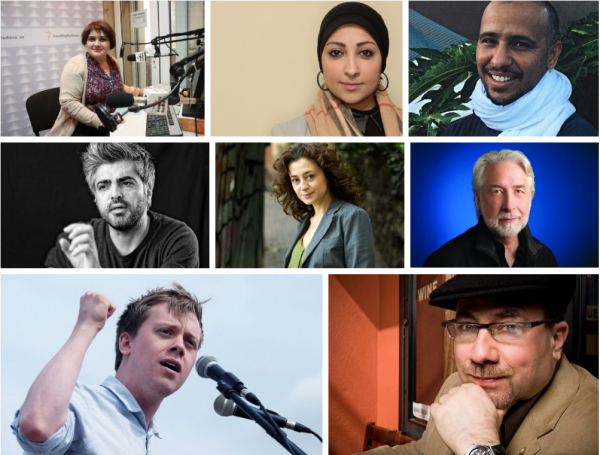
Women on the front line in the fight for freedom of expression
Maryam Al-Khawaja, Khadija Ismayilova (with Miranda Patrucic, Marina Petrillo)
Two women, two stories of denied rights, persecution, and the price that authoritarian regimes impose to those who seek truth and fight for freedom of expression. Maryam Al-Khawaja is an activist who had a leading role in the 2011 democracy protests in Pearl Square, Bahrain. While she was returning to her country, to visit her father who was protesting his life sentence with a hunger strike which had almost led to his death, she was attacked and imprisoned for 19 days, and then forced into exile with a specious conviction. Khadija Ismayilova is an Azerbaijan journalist who was intimidated and blackmailed, arrested and sentenced to seven years in jail in 2015 for covering news about the family of President Aliyev. Thanks to an international mobilization of colleagues — including Miranda Patrucic — and activists, she was freed. Khadija is currently under a travel ban and cannot leave Azerbaijan. She will participate via Skype.
My 15 years without charge in Guantanamo Bay
Mohamedou Ould Slahi (with Barbara Serra, Larry Siems)
The incredible and terrifying story of Mohamedou Ould Slahi, arrested in 2001 in his home country Mauritania and from there taken to the detention camp at Guantanamo Bay in Cuba. A nightmare of denied rights and arbitrary detention recounted in his book Guantanamo Diary (published in 2015, edited by Larry Siems), the first inside account of life in the prison. Now finally you can listen to live testimony from Mohamedou, who was released in October 2016 after 15 years of detention. Fifteen years without charge, in the name of security and of the fight against terrorism.
The last men in Aleppo
Firas Fayyad (with Amedeo Ricucci)
Interview of Firas Fayyad, director of the Sundance-winning film The Last Men in Aleppo. Clips of the documentary will be shown. The Last Men in Aleppo was filmed on the streets of Aleppo, now completely devastated by the civil war. The documentary premiered at the 2017 Sundance Film Festival, and follows the heroic rescue work of the White Helmets, perhaps the last ray of hope left for the civilians trapped in the city. Fayyad experienced the worst of the Assad regime: imprisoned in November 2011, he was tortured for months and now lives in exile. He will be interviewed by the Italian war correspondent Amedeo Ricucci.
Truth is a lost game in Turkey. Don’t let the same thing happen to you
Ece Temelkuran (with Marta Ottaviani)
Interview of Turkish journalist and author Ece Temelkuran by Marta Ottaviani. The interview will take as its starting point the 15 December 2016 Guardian opinion piece by Ece Temelkuran entitled Truth is a lost game in Turkey. Don’t let the same thing happen to you.
Role of digital companies in the evolution of news publishing
Richard Gingras (with Davide Casati)
Google’s Vice President of News Richard Gingras will be joined by Davide Casati of Corriere della Sera for a candid conversation on the role of digital companies in the evolution of news publishing. Responsible for all news products, Gingras will speak about Google’s Digital News Initiative, the progress of the open-source project AMP (Accelerated Mobile Pages) and industry trends including Google’s efforts to surface and highlight fact-checked content in News and Search.
The crisis of capitalism
Owen Jones (with Fabio Chiusi)
Are automation, robotics engineering and artificial intelligence a threat to workers’ rights? Or do these developments show that a post-capitalist and post-work society is on the horizon, one in which the relationship between citizen and society can be rethought and the threat of technological unemployment can be overcome? These are questions which bring into play complex economic, political and social factors, all in a context of growing inequalities, a crisis of confidence in the media and in democratic institutions, and the risk of new authoritarianisms. We will discuss these issues with Owen Jones, the author of Chavs: The Demonisation of the Working Class.
Without trust in the media, democracy is doomed
Craig Newmark (with Mario Calabresi)
In the last year mainstream media has been largely surprised by the vote on Brexit and the election of Donald Trump. The anti-establishment rhetoric has not only been underestimated but has become stronger and found consensus by attacking those who should have interpreted and understood the danger. Trolling, hate speech, and hoaxes are now established instruments of the consensus machine. While the creation and development of business models are priorities for media, in order to survive in the digital age, public confidence and the creation of strong communities are increasingly crucial factors. How can the role of philanthropy, in order to reverse the crisis of confidence and strengthen democracy and civic engagement, be crucial? We will discuss this issue with Craig Newmark, the creator of Craigslist, the most popular classified ad website in the world, and founder of the Craig Newmark Foundation in 2016. It has been a year where the Foundation has given considerable support to prominent communities such as Wikipedia ($6 million) and institutions such as the Poynter Institute ($1 million).
Stop worrying about fake news. What comes next will be much worse
Jonathan Albright (with Charlie Beckett)
The session will take as its starting point the issues raised in Jonathan Albright’s Guardian article of 09 December 2016 entitled Stop worrying about fake news. What comes next will be much worse.
Enough said. What’s gone wrong with the language of politics?
Mark Thompson (with Mario Calabresi)
The crisis of confidence in institutions and mainstream media represents a danger to democratic life. A democratic society needs space — whether physical or digital — where discussion and debate acknowledge the dignity of the opponent. If the political class fails to go beyond propaganda or self-centeredness, and if the media cannot find an appropriate language for citizens, those spaces risk becoming a moat that anti-establishment rhetoric easily fills with a language of hatred, anger and division, undermining the basis of society. If public debate sees language eroded, what does this imply about the actual state of health of our democracy? With Mark Thompson, president & CEO of The New York Times Company.
How to fight back against big data
Hossein Derakhshan, Mathew Ingram (with Fabio Chiusi)
How to disrupt, confuse and obfuscate algorithms on a massive scale in order to contaminate big data and its tyrannical use in limiting free speech and quality journalism.
Plan B: making a home for news on the open web
Aron Pilhofer, Dave Winer
In this session two open web innovators and thinkers, Aron Pilhofer and Dave Winer, will discuss the potential for news flows outside the silos, and how that can work to make the news industry and independent bloggers more free and able to innovate.
Background: The web is the platform with no platform vendor. In the silos we only get the features that the tech industry owners let us have. That means on Facebook no linking, styles or attached podcasts. On Twitter, a 140-char limit. In neither environment do readers click on links. On Facebook there’s an algorithm that controls what people see, and Twitter is moving in that direction.
News exists outside the silos, and the more news builds there, the more independence it will preserve. Also, by adding value to open publishing, we provide a path for the silos to pull in more features from the web, otherwise we’re just going to keep getting pulled into their algorithms and advertising. News has different needs.
Sites that illustrate these principles will be highlighted, and ways news people and bloggers can participate will be suggested. Discussion will be encouraged.
A new era of information warfare
Marcel Rosenbach (with Carola Frediani)
A new era of information warfare: the DNC, the Podesta mails, Sony Pictures, etc. State-sponsored hacking and leaking and what it means for journalism. “Strategic leaking” by states and intelligence services (as opposed to whistleblowers) — and the many practical and ethical questions which this poses for journalism and media. How do we cope with this new kind of information warfare, what is our role in it, what are our duties — and are there any best practises yet?
…
Panel discussions
A grand total of 112 panel discussions on many different subjects are offered in the festival programme. Panels are composed of from two to four (and very occasionally five) speakers plus moderator. A very broad range of speakers is involved. We provide here a small representative sample.
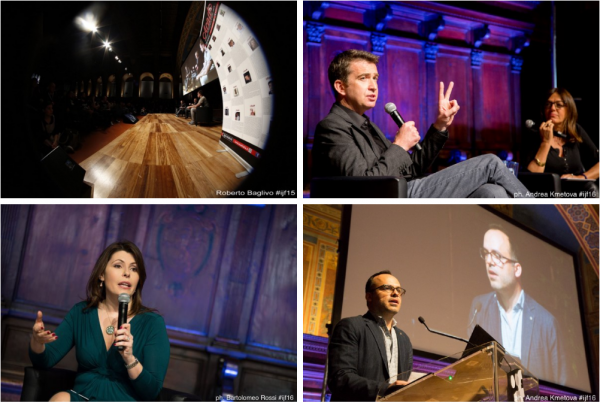 ‘Fake news’ and the misinformation ecosystem
‘Fake news’ and the misinformation ecosystem
Aine Kerr, Mark Little, Alexios Mantzarlis, Craig Silverman, Claire Wardle
Reporting emerging authoritarianism
Yavuz Baydar, Tamas Bodoky, Alexa Koenig, John Nery
How digital can save journalism in the Middle East and Arab World
Sakhr Al-Makhadhi, Fatemah Farag, Sana Sbouai, Farah Wael
The ethics of live video
Ben de Pear, Mark Frankel, Joanna Geary, Mandy Jenkins, Sue Llewellyn
Something old, something new: digital media and the coverage of climate change
Milene Larsson, Stuart Millar, James Painter, Akshat Rathi
How to tackle trolls and manage online harrassment
Mary Hamilton, Alexandra Pascalidou, Julie Posetti, Hannah Storm
The rise of live journalism
Yoeri Albrecht, Joris Luyendijk, Florence Martin-Kessler, Jakob Moll, Sameer Padania
News beyond advertising
Renee Kaplan, Turi Munthe, Rasmus Nielsen, Aron Pilhofer, Vivian Schiller
Hacking democracy? Russian hackers, Wikileaks, propaganda, US elections
Lorenzo Franceschi-Bicchierai, Carola Frediani, Stefania Maurizi, Andrei Soldatov
Towards a relationship of trust: journalism, philanthropy and newsroom independence
Ludovic Blecher, Maria Teresa Ronderos, Nienke Venema, Rob Wijnberg
Investigating big data: collaboration and best practice
Anna Babinets, Mar Cabra, Nicolas Kayser-Brill, Stuart Millar, Richard Sambrook
Improving news literacy through collaboration
Charlie Beckett, Dan Gillmor, Mary Hamilton, Aine Kerr
Investors in independent media
Mariano Blejman, Turi Munthe, Sameer Padania, Victoria Powell, Ross Settles
Communicating the news to young people
Mathew Ingram, Jeff Jarvis, Lucy Marcus, Maximilian Wolff (age 10)
In addition to the above, the programme also offers a total of 13 sessions specific to the subjects of Data Journalism and Engagement.
…
Workshops
A set of 37 workshops to choose from, including 5 workshops run by Google, 5 by Facebook and 3 by First Draft Media. There are also 7 sessions in the Hackers’ Corner.
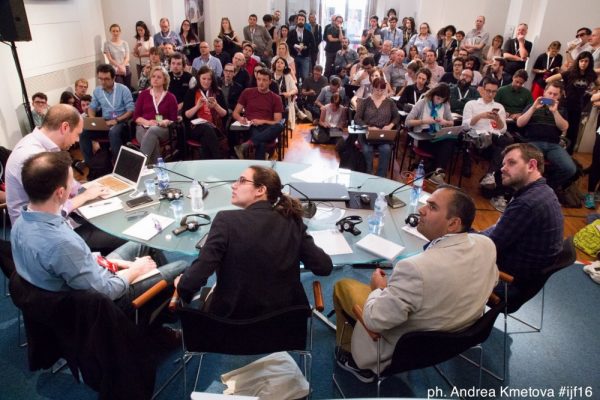
…
Presentations
There are 21 presentations in the festival programme. We highlight here 6 for reference.
#Hacked: Al Jazeera’s interactive news game on Syrian cyberwar
with Julian Ruhfus
Google Accelerated Mobile Pages
with Luca Forlin
Algorithm tips: how to investigate government algorithms
with Nicholas Diakopoulos
WordPress, the opportunities of the open web
with Luca Sartoni
Football Leaks and Panama Papers: two tales of great journalism
with Mar Cabra and Stefan Candea
InnovateAFRICA: million-dollar fund for media innovation in Africa
with Justin Arenstein and Joyce Barnathan
…
Documentaries
Including:

I love Dick (the first two episodes of the new series)
Organised in association with Amazon
Nobody speak
organised in association with Netflix
with an introductory interview of Lisa Nishimura, Vice President of Original Documentary for Netflix, by Mario Calabresi
…
Books
There are 13 book presentations, of which we highlight one.
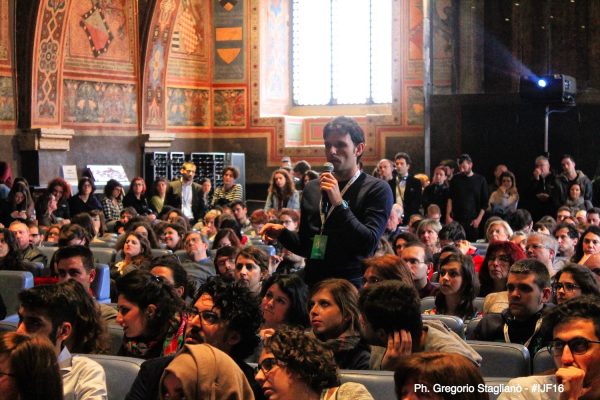
Journalism after Snowden: the future of the free press in the surveillance state
edited by Taylor Owen and Emily Bell (2017)
with Charlie Beckett, Janine Gibson, Dan Gillmor and Taylor Owen



